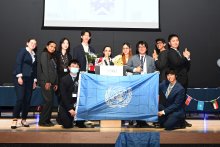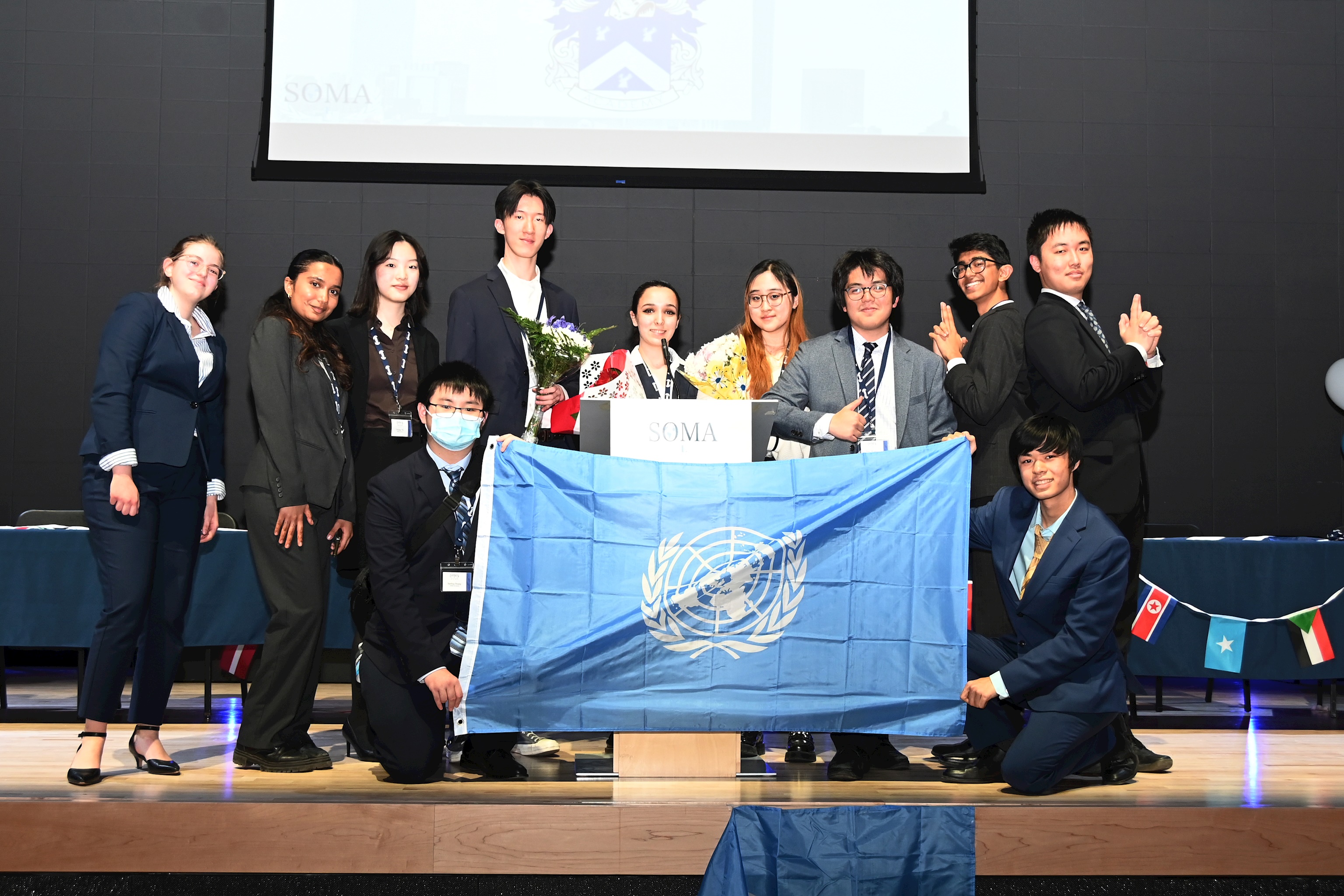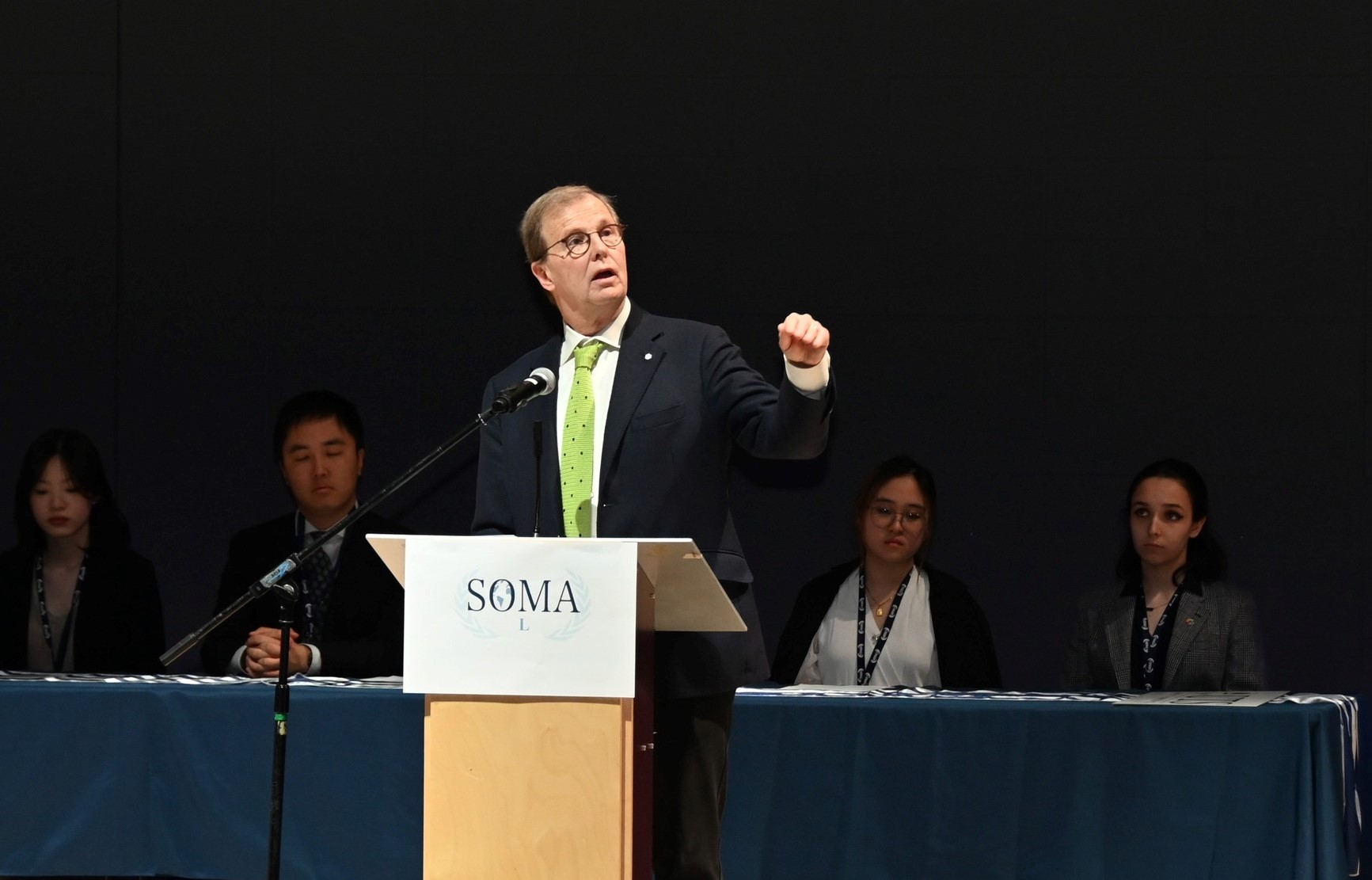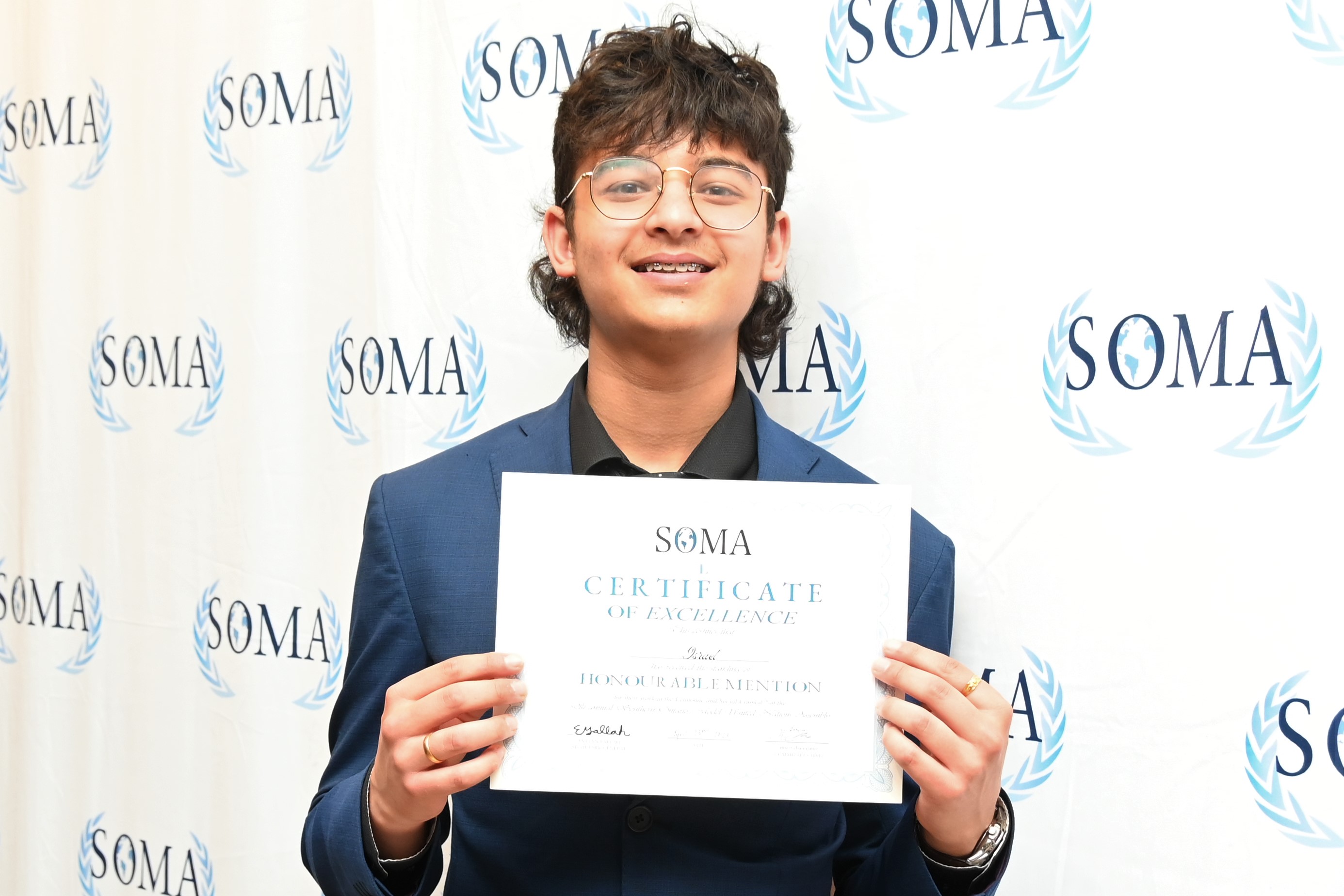371 Bloor Street West
Toronto, ON M5S 2R7 get directions
Toronto, ON M5S 2R7 get directions



UTS students on the SOMA Secretariat, who spent almost a year organizing this event, at the end of the closing ceremony.
The two delegates said they were “appalled” that millions of Afghan refugees living in camps in nearby border states may be denied urgent healthcare access due to a lack of infrastructure as they brought forward a resolution to address the issue at the United Nations Security Council, one of several committees convening at this year’s Southern Ontario Model United Nations Assembly (SOMA), organized by University of Toronto Schools (UTS) students in April.
The 50th anniversary edition of SOMA marked the first fully in-person event since the pandemic began and the largest event of its kind in southern Ontario, with 450 delegates attending the three-day Assembly, held at University of Toronto and UTS, in partnership with the Munk School of Global Affairs and Public Policy.
Students from across Ontario delved into world issues ranging from abortion access to the Russia-Ukraine war, IMF voting structure to carbon credits and more in model committees such as the World Health Organization, the International Monetary Fund, Interpol and others.
The resolution to support healthcare for Afghan refugees was one of many world-changing ideas brought forward. They’d determined where the money would come from ‒ France was committing €25 million a year over the next four years, and Switzerland contributing €20 million per year, and they were calling on other nations to make a contribution. They stipulated the money would be distributed quickly and not tied up in government red tape, with 66 percent of funding injected directly into hospitals and charities operating there and 33 percent earmarked for local health care. The funds would also support a much-need overhaul to local care in Tajikistan, Pakistan and Turkmenistan, where the refugee camps are located.
As in real life, there were qualms ‒ the 20 delegates in the United Nations Security Council raised questions such as “How are you going to properly ensure the funding is going directly towards the resolution and is there any way you’re enforcing this?” and comments like “Clause four states the need for this to be executed effectively with no issues ‒ it's a great message but quite optimistic. Do the sponsors have any plans, or contingencies in place to address the issues that may arise?”

SOMA Secretary-General S6 (Grade 12) Evelyn, the chief organizer of the event. Photo by S5 (Grade 11) Julia.
SOMA Secretary-General S6 (Grade 12) Evelyn, the chief organizer of the event, said she was impressed at the level of debate in the committees. “In one of the United Nations Security Council committee rooms, they were debating terrorist use of drones and communications and the question became ‘how do we define terrorism?’ The United States came in with the FBI definition. Then Switzerland said they have a much broader definition of terrorism, but they’ve been criticized for that. The question became, ‘How do we resolve this by creating a definition of terrorism in our resolution that fits all of these countries, but also can't be misused?’ If you say each country gets to use their own personal definition of terrorism, there are authoritarian governments that will totally misuse that for their own personal gain.”
One of the many UN committees of SOMA, pictured inside University of Toronto’s University College, where some of the committees convened. Photo by S5 (Grade 11) Julia.
Not only do students hone their public speaking and debating skills, but they complete extensive research into the perspective of a country before the conference even begins, reviewing documents on the issues, and developing position papers submitted before the start of the conference, with a mandate to represent their country.
As a student leader who has been involved at SOMA since she came to UTS in M4 (Grade 10) and who participated in Model United Nations before that, Evelyn transformed her experience to the real UN last fall, speaking over Zoom about how Model UN provides a gateway for students to learn about global challenges. “It was so unreal to be able to be talking about Model UN to the United Nations General Assembly,” she says, “That was a huge full circle moment for me.”
The conclusion of SOMA is another, marking the end of a year-long process to plan this massive undertaking, overseen by Evelyn and the 10 other UTS students who comprise the event’s Secretariat, which also involved another 60 UTS students as volunteers.

UTS alum David Morley C.M. ’73, the president and CEO of UNICEF Canada, told delegates that investing in the work of local community health workers is vital to saving children’s lives, speaking in the Withrow Auditorium at UTS.
For the 50th anniversary, they secured high-profile keynote speaker, UTS alum David Morley C.M. ’73, the president and CEO of UNICEF Canada, at the event’s opening assembly in the new Withrow Auditorium at UTS.
“Our operating assumption at UNICEF, and the operating assumption of all of United Nations, that the crisis would end and then people would go back home, is changing,” David told delegates, “because today, more people have had to flee violence and leave their homes than at any time since the creation of UNICEF 75 years ago. How do we carry out our work, when there's a good chance that short sharp emergencies will probably turn into long-term, ongoing crises?”
Over the last eight years, he says UNICEF has returned to its roots as a humanitarian emergency relief organization, and while they apply the UN Sustainable Development Goals to their work, he notes one of the major barriers to these goals is they become impossible when people are fighting. In April, UNICEF released its 2023 State of the World’s Children report, For Every Child, Vaccination. The organization’s goal of preventing needless deaths for children under the age of five will “stimulate progress and focus our efforts in a manner that provides a multiplier effect on many, many positive social outcomes,” he says.
The best way to increase preventable deaths amongst the world's marginalized people is through primary health care services and community health workers that are delivered at the community level at decentralized clinics with a focus on children and women, David says.
Being the SOMA keynote represents another full circle ‒ David was part of SOMA in its first incarnation more than 50 years ago as the Toronto Model Plenary in 1972-73. The Plenary became SOMA in 1974, hosting its first conference for more than 300 students at Port Credit Secondary School. Years later, UTS took over full management of the event, and a partnership with the Munk School was formed in 2022.
This year, 11 Master’s students from the Munk School primed delegates on the issues at hand in speaker’s sessions targeted towards each of the committees on the first night of the conference.
“For carbon credits, the economic side and climate action side are very heavily intertwined,” says Michael Kalaparambath, a Munk student who spoke at the SOMA United Nations Environment Programme. “I wanted to show students that although we can make these lofty, climate change goals and use carbon credits, economics can outweigh the goals. Certain industries need to continue using natural gas because there's no economically feasible substitute. Carbon credits allow you to purchase credits to offset the carbon you emit.”
Another guest speaker was Dr. Steven J. Hoffman, who gave delegates a unique perspective on the intricacies of international law from. The Dahdaleh Distinguished Chair in Global Governance and Legal Epidemiology and a professor of global health, law and political science at York University, Steven serves as the director of both the Global Strategy Lab and the WHO Collaborating Centre on Global Governance of Antimicrobial Resistance, and the vice-president of data and surveillance with the Public Health Agency of Canada.

Under-Secretary-General: Operations 1 Eshaal organized the gala, held at the El Mocambo. Photo by S5 (Grade 11) Moineau.
For UTS student S5 (Grade 11) Eshaal, who serves on the SOMA Secretariat and plans to pursue international relations, the opportunity to get a sense of the Munk School and international relations was a major motivator for getting involved.
“We can discuss world issues with like-minded individuals the same age as us that we don't always get to discuss at school, and really research them,” says Eshaal. “The committee l chaired this year was the United Nations Conference on Trade and Development and we discussed the global housing crisis and smart cities because I really wanted to talk about how the pandemic has affected our economy. It was amazing to see the 40 delegates come up with solutions to these problems within a matter of three days.”
The joint crisis rooms give delegates a change to reshape history at a crucial juncture – overseeing the Joint Crisis Room for the Battle of Vienna (1863) between the Ottoman Empire and the Holy Roman Empire were UTS students (left to right) S5 (grade 11) Olivia, M4s (grade 10s) Leo and Grace, and S6 (grade 12) Yvonne, the under-secretary-general: crisis.
Eshaal was also tasked with planning the gala for this year’s event ‒ pre-pandemic SOMA usually included a formal banquet, but this year the Secretariat opted for more of a party, where delegates could mingle and potentially build support for their resolutions for the last day of the conference. The Casino Royale gala held at the classic Toronto club, the El Mocambo, included mocktails, Polaroids, and live entertainment from the UTS SHOW dancers (SHOW is an annual performance put on by UTS students).
“It was incredible to see all our hard work throughout the past year come to life, and then see the exceptionally talented dancers on stage, and everyone cheering for them,” she says. “It was really bittersweet to see the end of this. SOMA has taken over my life for the past year in amazing ways, and I have been able to experience things that I never thought I would be able to.”

Siddanth, a student from St. Joseph Secondary School in Mississauga, earned an honourable mention at his first Model UN.
It was the first model UN for Siddanth, a student from St. Joseph Secondary School in Mississauga. Not only did he learn so much he didn’t know about other countries, he also learned from the other delegates, and earned an Honourable Mention. “Some of the delegates really impressed me and I could see them as future diplomats,” he says. “I wasn't expecting to be challenged like that. They really did push me to my limits.”
His resolution, which aimed to support sub-Saharan African countries, dealt with ways of technology and knowledge sharing, flexible loans, and new ways of financing that would help their domestic economy grow, was made in partnership with other nations (he was Israel) and was passed in the United Nations Economic and Social Council.
“Overall, I'd say it really helps your communication skills and confidence when you're trying to speak in a committee,” says Siddanth. “It's really about knowing what you're saying, knowing how you're going to say it and being confident and courageous enough to get up there and say it in front of everyone.”
As Eshaal points out, students are not able to talk about world issues at Parliament yet, so SOMA gives them a platform.
“It's important for us to talk about world issues,” she says, “and discuss and debate them amongst ourselves, and come up with solutions for the future, when we have degrees and the opportunity to lead the world.”
Learn more about SOMA.
Diplomacy in action at SOMA. Photo by S5 (Grade 11) Julia.
